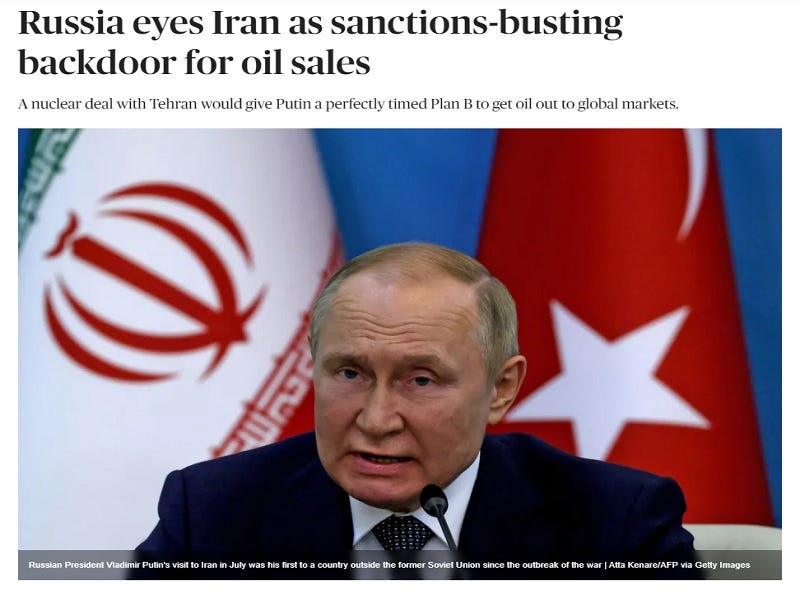The US Is Furious Because It Can’t Stop A Prospective Russian-Iranian Oil Swap Deal
The Russian and Iranian economies will mutually benefit by selling discounted resources on the global market while countries like India will accelerate their rise as multipolar Great Powers through the purchase of these exports. Their trilateral axis will continue becoming a force to be reckoned with, especially if the first two coordinate their natural gas activities seeing as how they account for the largest such reserves in the world.
The influential US-led Western Mainstream Media (MSM) outlet Politico expressed extreme frustration on Tuesday at America’s inability to stop a prospective Russian-Iranian oil swap arrangement pending the successful renegotiation of the Joint Comprehensive Plan Of Action (JCPOA) that recent reports indicate might be on the brink of finally being reached. In their piece titled “Russia eyes Iran as sanctions-busting backdoor for oil sales”, they lament how easily “Iran could import Russian crude to its northern Caspian coast and then sell equivalent amounts of crude on Russia's behalf in Iranian tankers leaving from the Persian Gulf.” This pact would be mutually beneficial and further strengthen the rapidly intensifying strategic partnership between these multipolar Great Powers.
The global systemic transition to multipolarity that unprecedentedly accelerated in light of the latest US-provoked phase of the Ukrainian Conflict that began half a year ago is fundamentally transforming Eurasia. President Putin recently declared that Russia restored its status as a world power, which is an accurate reflection of its role in contemporary International Relations. To explain, the US-led West’s unprecedented sanctions counterproductively crippled the economic-financial basis of America’s declining unipolar hegemony, which coincided with Russia teaming up with India and Iran to forge a third pole of influence in the present bi-multipolar intermediary phase of the above-mentioned systemic transition to more complex multipolarity (“multiplexity”).
These two factors irreversibly altered the course of the New Cold War: the US’ unipolar hegemonic decline became inevitable while India helped Russia preemptively avert any potentially disproportionate dependence on China that some observers speculated could have led to the People’s Republic replacing America’s sole superpower status in the coming future and thus replicating the systemic inequalities connected with that scenario. To be absolutely clear, the author doesn’t extend credence to that dire prediction about China replacing the US’ prior role in International Relations but is simply pointing out how India’s black swan intervention just made that scenario impossible in any case.
Having explained the game-changing structural significance of the Russian-Indian Strategic Partnership, readers can now better understand the complementary role that the Russian-Iranian one plays. While less directly influential in terms of immediately reshaping the trajectory of the global systemic transition, it’s no less significant with respect to its long-term implications due to the impact that it’s poised to have on the energy industry. These two multipolar powers are major players in that trade, especially the natural gas one. Their speculative plans for an oil swap deal that prompted such panic from Politico carry with them the potential to ensure reliable revenue generation for both while also helping their partners.
The Russian and Iranian economies will mutually benefit by selling discounted resources on the global market while countries like India will accelerate their rise as multipolar Great Powers through the purchase of these exports. Their trilateral axis will continue becoming a force to be reckoned with, especially if the first two coordinate their natural gas activities seeing as how they account for the largest such reserves in the world. It’s therefore not difficult to foresee that the global energy industry could eventually be revolutionized by the Russian-Iranian Strategic Partnership, which could in turn deal a deathblow to the so-called “petrodollar”, especially in the scenario of Saudi Arabia selling oil to China and others in yuan.
De-dollarizing the natural gas trade, whether in parallel with the aforesaid scenario of Saudi Arabia and China leading the de-dollarization of the oil one or instead of it in the event that this second scenario doesn’t transpire for whatever reason, will go down as a landmark event in the history of the global economy. Russia and Iran’s speculatively impending close cooperation in the oil trade will set the stage for what’s very likely to come, which will have outsized importance for everyone since natural gas consumption is expected to continue growing for the indefinite future. In practical terms, this means that those two will collectively exert disproportionate influence over the global economy in an indirect but nevertheless tangible way.
Nobody should doubt their intentions either since Iran has been a revolutionary state since 1979 while President Putin just unveiled his country’s global revolutionary manifesto late last month. Iran and Russia therefore see eye-to-eye on the need to do all that’s required in order to accelerate the systemic transition to multipolarity, which unquestionably includes jointly leveraging their roles in the energy trade so as to become superpowers in this industry. They’ll mutually benefit while also speeding up their shared Indian strategic partner’s rise as a Great Power, which will help break International Relations out of their present bi-multipolar intermediary phase and thus herald the emergence of complex multipolarity exactly as their leaderships envision, all to the detriment of the US’ declining hegemony.




